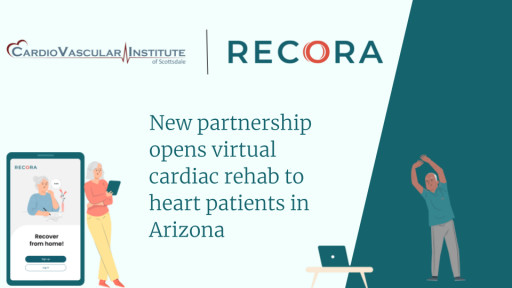
NEW YORK, April 11, 2023 (Newswire.com) - Recora today announced its partnership with Cardiovascular Institute of Scottsdale to offer virtual cardiac rehabilitation for heart disease patients. The program adds to the robust suite of services CVI Scottsdale provides to heart disease patients, creating a new, innovative way to expand access for patients and allow them to recover from home in a virtual environment.
"As our practice continues to evolve and identify ways to better serve our patients, it seemed a natural fit to introduce Recora's Virtual Recovery Program to our market," said Dr. Nassim Haddad, Cardiologist, CVI Scottsdale. "Home-based cardiac rehab is proven to increase participation and improve outcomes, and we are excited about the possibilities this program can deliver to help our patients better their lives."
Recora will provide virtual tools for CVI Scottsdale's patients that can be accessed from the comfort of their own home, removing issues patients face with transportation and scheduling that prevent them from being able to access center-based care, along with on-demand support from care teams, 24/7 chat, and additional resources available throughout the program.
"Recora is fortunate to work with many leading health systems and practices throughout the United States, and our partners at CVI Scottsdale are as dedicated as any to their patient's cardiovascular health and care," said Recora CEO Abhishek Chandra. "Expanding our program to the Arizona community is an intriguing challenge for our team, and we look forward to the opportunities this will bring to heart disease patients in search of the right rehab program to meet their needs."
Recora's Cardiac Recovery Program has garnered industry-leading results that include:
- 15% hospital readmission rate for Recora patients, versus the national average of 43% across Medicare patients with heart failure at six months.
- 87% Recora cardiac recovery program completion rate, versus the national average of 26%.
- 80% of patients with hypertension markedly improved their blood pressure due to diet and exercise
- 94% of Recora patients adhere to their cardiac medication.
- 80% improvement of distance and strength gains among Recora patients.
ABOUT RECORA
Recora's mission is to redefine the future of heart health. Recora's Cardiac Recovery Program for health systems, medical groups and health plans makes it easier to recover from a cardiac event through immersive programs delivered online. With Recora, healthcare providers are able to establish a longitudinal relationship with patients and help them live longer, fuller lives. To learn more, visit recora.com.
ABOUT CARDIOVASCULAR INSTITUTE OF SCOTTSDALE
Cardiovascular Institute of Scottsdale (CVIS) was created in 2012 as a team of experts dedicated to the treatment and prevention of heart disease and vascular conditions using the most up-to-date, modern, and evidence-based treatments and medications. The care team provides a personalized and comprehensive treatment plan that incorporates an emphasis on diet, exercise, and overall healthy habits. The goal is to optimize the cardiac risk to prevent future cardiovascular events. When patients present with problems that may be cardiovascular in nature, we determine the most likely diagnosis and formulate a treatment plan and follow-up strategy that is tailored for every patient based on their profile and risk factors.
Contact Information:Adam Hritzak
Director of Marketing, Recora
[email protected]
614-946-7916
Ilene Klein
COO
[email protected]
480-747-6532
Original Source: Recora and Cardiovascular Institute of Scottsdale Announce Virtual Cardiac Rehabilitation Partnership